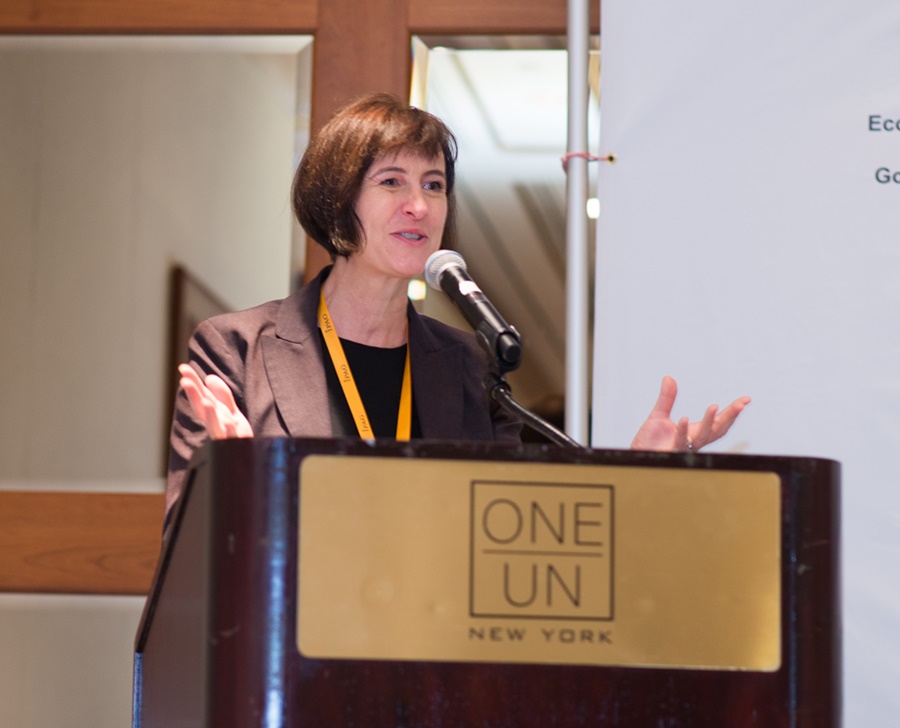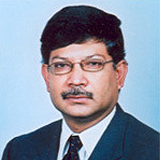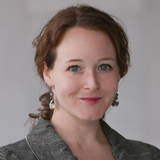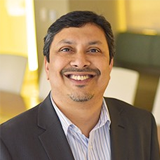MDGs & SDGs: Connecting the Dotted Lines
Keynote presenter:
Sarah Cliffe, Director, Center on International Cooperation, New York University
Moderator:
Swaminathan S. Anklesaria Aiyar, Research Fellow, Center for Global Liberty & Prosperity, Cato Institute, Washington DC
Panelists:
Masud Bin Momen, Ambassador & Permanent Representative, Permanent Mission of Bangladesh to the United Nations in New York
Reid Hamel, Senior Fellow, Global Food Security Project, Center for Strategic and International Studies (CSIS)
Anit Mukherjee, Policy Fellow, Center for Global Development
Thangavel Palanivel, Deputy Director, Human Development Report Office, United Nations Development Program (UNDP)
Ms. Sarah Cliffe, Director of Center on International Cooperation, highlighted that a strong combination of policy development, advocacy, governance and new approaches are required to achieve the goals as we transition from MDG to SDG. The lessons learned from MDGs are relevant to the successes of SDGs but she highlighted six significant aspects. She stressed that SDGs include huge range of inclusion targets. There are still differences in institutional capacity and resources, and we need to keep this in mind. Those grappling with major poverty challenges should still receive resources and external financing. She recommended that health and education needs continuity, and we now need to look into quality and not just quantity. Inequality goal, ocean and sustainability, consumption, peace and justice – these SDGs reflect shortcoming of MDGs. In order to achieve the SDGs, we need to go across more than one agenda. We can’t look into one goal without looking into the other goals (e.g. violence in goal 16 cuts cross through ending women violence in goal 5). More than looking at average progress in each country, we need to look into groups left behind. This means looking into vertical inequality and horizontal inequality (regions, genders, between ethnic groups, sectarians). She highlighted that multi-stakeholder platform is needed for implementation.
While implementing the SDGs, we need to look at horizontal inequality, inequality between genders, different regional groups, ethnic and family groups. When we find that a group is left out, that acts as a fuel for discontent within the community.

Sarah Cliffe
Director, Center on International Cooperation, New York University
Mr. Masud Bin Momen said that it is possible for least developed countries to become middle income countries. In MDGs, there were hardly any reference to LDCs. Consent and participation of LDCs were not adequate. He recommended that global development requires new, comprehensive, and holistic approach. Cross-international collaboration and better understanding of working along cross-sectoral groups are needed. He highlighted that we are not just talking about billions, but trillions that we need to successfully implement the SDGs. Remittances and ODIs have not been encouraging lately, however. We have seen how vulnerable some countries are (e.g. Caribbean area). Man-made issues have also to be taken account for; example, migration from Myanmar bears burden for Bangladesh as well.
The proactive and persistent role of the LDCs to make the SDGs more inclusive and participatory contributed to the emergence of the two guiding principle: Leaving no one behind and Reaching the farthest behind first.

Masud Bin Momen
Ambassador & Permanent, Representative, Permanent Mission of Bangladesh to the United Nations in New York
Ms. Reid Hamel talked about consequences pertaining to food and nutrition security issues – the physical and cognitive deficits can be chronic and severe, and largely irreversible. Food and security cuts across many development demands. There are four conditions needed for food and nutrition security: availability, access to food, utilization, stability over time. None of these is tied in agricultural production – and this is a dialogue that needs to be discussed. According to her, Latin America and Southeast Asia made impressive gains. About 25% of children in Sub-Saharan Africa are undernourished and some are stunted. She highlighted that in Bangladesh, rice production was tripled. She recommended that good governance and good political leadership is needed. She said that central planning is not needed, we need to think of livelihoods broadly, social security nets, thinking about environmental changes. Infrastructure and trade are also important.
Bangladesh posits a great example of good governance and political leadership & ownership in the context of food security in the SDGs. Food Security is always in the national political agenda and credit is not only due for that but also for the nation’s administrative structure too.

Reid Hamel
Senior Fellow, Global Food Security Project, Center for Strategic and International Studies (CSIS)
Mr. Anit Mukherjee said that as someone working from Center for Global Development he has seen that senior staff meetings were divided. Some found MDGs acrimonious, some doubtful. Still, consensus was this is the best that we can do. We need to understand what the SDGs are given the implementation and financing challenges. He said that we need to be smarter about investments; we are not getting the same level of investments in SDGs. Development has to shift to subnational from central governments, but international community does not understand this. It is important to integrate technology in the whole discourse.
Governments and donors need to be smarter about their investments; human development is not going to get as much fund as MDGs.

Anit Mukherjee
Policy Fellow, Center for Global Development
Mr. Thangavel Palanivel shared that one of the lessons learned was that not all countries have long-term budgets and planning; and this is critical to SDG implementation. SDGs are long-term and transformative. He recommended that the Prime Ministers or Presidents need to develop coordination units to improve policy governance and integrated nature of implementation. There has to be a needs assessment and costing exercise, as well as creating robust financial strategy. We need to know what intervention is needed, and know financial strategy is needed. He stressed on the importance of global partnership, and global environment. He also highlighted the importance of working mechanism for international and national accountability. We don’t have enough of this at the moment and each stakeholder has to be accountable in contributing to SDGs.
In the intra panel session Mr. Mukherjee said that in India, having the identification system helps restructuring subsidies and government mechanism and this squeezes out efficiencies. There is a slowdown of domestic aid coming in, but in LDCs, there are efficiencies to be gained but not tapped in, and technologies and digitalization will help. Mr. Palanivel said that we need to address changing commodity prices. This means that there is a need for diversification of economic sources. When asked about whether international cooperation is a burden and whether there is need to focus internally, Ms. Hamel said that SDGs are universal and a lot of our economic challenges are not so far from those in development spaces. When asked about accountability, Mr. Momen said that UN has set up a mechanism where each country reports voluntarily. Early this year, Bangladesh and 43 other countries, reported on status of implementation. This is a kind of peer-review. Next year, more than 40 have lined up. There is this opportunity of self-assessment and peer review. Mr. Mukherjee pointed out while MDGS had focused targets, complete with metrics and measures, SDGs do not have yardsticks. Thus it is needed to make the SDGs comparable.